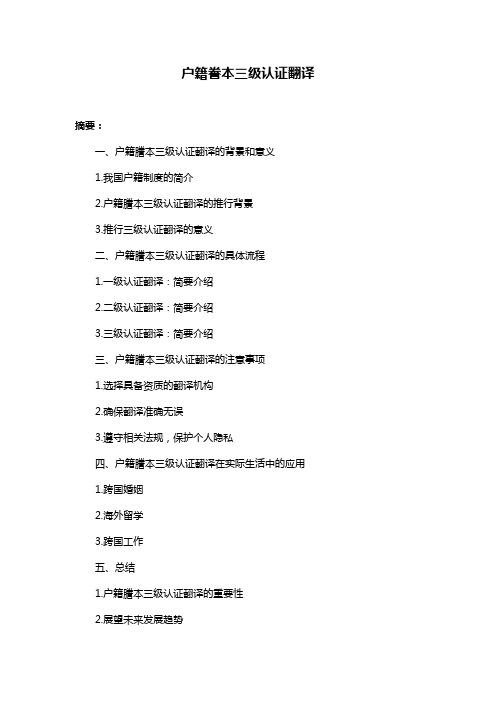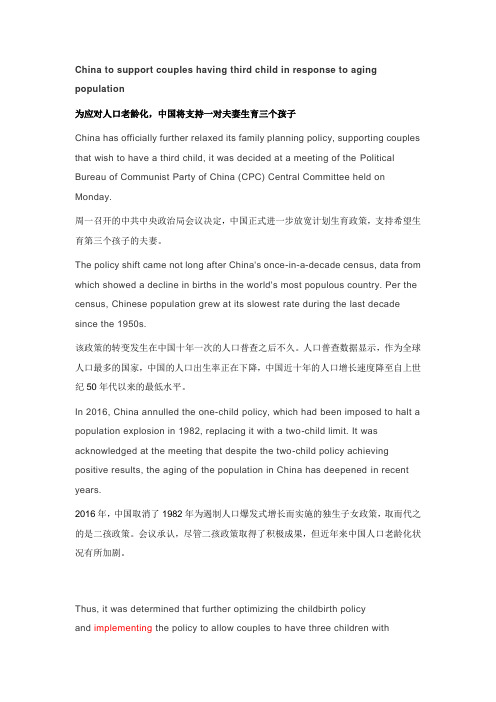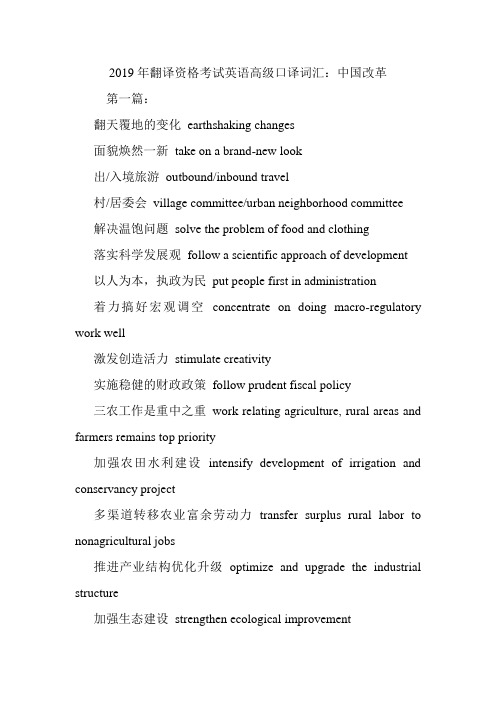【译之灵每日翻译】我国将进一步推进“户籍制度改革”
户籍誊本三级认证翻译

户籍誊本三级认证翻译摘要:一、户籍謄本三级认证翻译的背景和意义1.我国户籍制度的简介2.户籍謄本三级认证翻译的推行背景3.推行三级认证翻译的意义二、户籍謄本三级认证翻译的具体流程1.一级认证翻译:简要介绍2.二级认证翻译:简要介绍3.三级认证翻译:简要介绍三、户籍謄本三级认证翻译的注意事项1.选择具备资质的翻译机构2.确保翻译准确无误3.遵守相关法规,保护个人隐私四、户籍謄本三级认证翻译在实际生活中的应用1.跨国婚姻2.海外留学3.跨国工作五、总结1.户籍謄本三级认证翻译的重要性2.展望未来发展趋势正文:户籍謄本三级认证翻译是我国在国际化进程中,为满足跨国交流需求而推行的一项重要举措。
它对于维护公民合法权益,推动国际间人才流动和信息互通具有深远影响。
在我国,户籍制度是一项基本的国家行政管理制度。
随着我国改革开放和国际交流的不断深化,越来越多的公民需要在出国留学、工作、生活等场景中使用户籍謄本。
为了确保户籍謄本在跨国交流中的真实性和有效性,我国推出了户籍謄本三级认证翻译制度。
具体来说,户籍謄本三级认证翻译分为三个级别。
一级认证翻译主要是对户籍謄本的基本内容进行翻译,包括姓名、性别、出生日期、籍贯等基本信息。
二级认证翻译则涉及到户籍謄本中的详细信息,如家庭成员、婚姻状况、学历等。
三级认证翻译则是对二级认证翻译的进一步确认,以确保翻译的准确性和完整性。
在办理户籍謄本三级认证翻译时,公民需要选择具备资质的翻译机构,并确保翻译准确无误。
此外,还需遵守相关法规,保护个人隐私。
在现实生活中,户籍謄本三级认证翻译在跨国婚姻、海外留学和跨国工作等场景中发挥着重要作用。
例如,跨国婚姻双方需要提供经过认证的户籍謄本作为婚姻登记的依据;海外留学生需要将户籍謄本翻译成目标国家的语言,以便在当地办理入学、住宿等手续;跨国工作者则需要将户籍謄本翻译成所在国家的官方语言,以便在当地办理工作许可等手续。
总之,户籍謄本三级认证翻译对于保障公民在国际间的合法权益具有重要意义。
对外经济贸易大学翻译硕士考研真题:汉译英原文

凯程翻译硕士考研指导第 1 页 共 1 页 对外经济贸易大学翻译硕士考研真题:汉译英原文考研备考的过程中,真题是必不可少的。
下面是凯程考研搜集整理的对外经济贸易大学英语翻译基础考研真题——汉译英原文。
汉译英的原文我国人口老龄化对经济增长的潜在影响理论研究认为, 老龄化会减少劳动力供给, 降低社会储蓄率, 导致产出和资本形成能力下降, 最终影响经济增长。
同时, 发达国家的实际表明, 随着人口老龄化, 养老费用及人均医疗费用均会大幅上升, 加重政府财政负担。
与发达国家“富老同步冶或者“先富后老冶相比, 我国人均收入水平仍然较低, 属于明显的“未富先老冶, 对经济增长的影响日益明显。
一是未来劳动力供给减少和成本上升, 将不利于企业尤其是劳动密集型企业发展。
二是老年抚养比淤上升将影响居民储蓄数量和储蓄倾向, 并通过降低企业利润间接影响企业储蓄行为。
储蓄下降将减少投资资金来源, 并影响资金价格。
三是加重财政支出负担。
与发达国家相比, 我国社会保障水平较低, 养老保险和医疗保险面临资金紧张、覆盖面窄等问题, 许多地方存在养老金缺口。
随着我国社会保障体系逐渐完善, 养老金水平不断提高, 医疗保障覆盖面扩大, 未来老龄化所带来的财政支出将大幅增长, 财政压力随之增大。
人口老龄化将是我国需要面对的一个长期问题, 应加快采取相关应对措施, 继续推进新型城镇化建设和区域经济协调发展, 进一步推动农村剩余劳动力的转移和就业。
加大人力资本投入, 提高劳动者素质。
大力促进科技创新, 实现产业结构优化升级, 通过技术进步来弥补劳动力优势的逐步丧失。
加快健全社会保障体系, 继续扩大养老保险和医疗保险覆盖面,逐步提高社会保障水平。
小提示:目前本科生就业市场竞争激烈,就业主体是研究生,在如今考研竞争日渐激烈的情况下,我们想要不在考研大军中变成分母,我们需要:早开始+好计划+正确的复习思路+好的辅导班(如果经济条件允许的情况下)。
2017考研开始准备复习啦,早起的鸟儿有虫吃,一分耕耘一分收获。
考研英语阅读外刊原文(环球时报)

China to support couples having third child in response to aging population为应对人口老龄化,中国将支持一对夫妻生育三个孩子China has officially further relaxed its family planning policy, supporting couples that wish to have a third child, it was decided at a meeting of the Political Bureau of Communist Party of China (CPC) Central Committee held on Monday.周一召开的中共中央政治局会议决定,中国正式进一步放宽计划生育政策,支持希望生育第三个孩子的夫妻。
The policy shift came not long after China's once-in-a-decade census, data from which showed a decline in births in the world's most populous country. Per the census, Chinese population grew at its slowest rate during the last decade since the 1950s.该政策的转变发生在中国十年一次的人口普查之后不久。
人口普查数据显示,作为全球人口最多的国家,中国的人口出生率正在下降,中国近十年的人口增长速度降至自上世纪50年代以来的最低水平。
In 2016, China annulled the one-child policy, which had been imposed to halt a population explosion in 1982, replacing it with a two-child limit. It was acknowledged at the meeting that despite the two-child policy achieving positive results, the aging of the population in China has deepened in recent years.2016年,中国取消了1982年为遏制人口爆发式增长而实施的独生子女政策,取而代之的是二孩政策。
户籍改革

1964年8月,国务院批转了《公安部关于处理户口迁移的规定(草案)》,该文件比较集中的体现了处理户 口迁移的基本精神,即两个“严加限制”:对从农村迁往城市、集镇的要严加限制;对从集镇迁往城市的要严加 限制。此规定堵住了农村人口迁往城镇的大门。
2014年7月30日,国务院公布了《关于进一步推进户籍制度改革的意见》,宣告中国实行了半个多世纪的 “农业”和“非农业”二元户籍管理模式,将退出历史舞台。
2017年,户籍制度全面改革,重点推出了推进农业转移人口市民化、加快实施居住证制度、解决无户口人员 登记户口问题、推进居民异地受理等“三项制度”、开展户口登记管理清理整顿、提高户口办理时效、畅通户口 办理监督渠道等七个方面的便民利民措施。
人口流动是社会发展的必然结果,快速的经济发展必然产生大量的人口流动,美国、澳大利亚、香港等国家 和地区都是世界上人口流动量大,人员迁徙最频繁的国家和地区,同时也是经济高速发展之地。
正如人口学专家研究表明:合理的人口流动能促进商品经济的发展,有利于人才交流和劳动力资源配置。为 实现公民的择业、居住以及迁徙自由,国家正采取多种措施鼓励、支持和引导人口的正常、合理流动,中国未来 的人口管理制度将更灵活,更理性,更符合现代经济发展的需要。
1984年10月,国务院发布《关于农民进入集镇落户问题的通知》,规定凡在集镇务工、经商、办服务业的农 民和家属,在集镇有固定住所,有经营能力,或在乡镇企事业单位长期务工,准落常住户口,口粮自理。
翻译资格考试英语高级口译词汇:中国改革.doc

2019年翻译资格考试英语高级口译词汇:中国改革第一篇:翻天覆地的变化earthshaking changes面貌焕然一新take on a brand-new look出/入境旅游outbound/inbound travel村/居委会village committee/urban neighborhood committee解决温饱问题solve the problem of food and clothing落实科学发展观follow a scientific approach of development 以人为本,执政为民put people first in administration着力搞好宏观调空concentrate on doing macro-regulatory work well激发创造活力stimulate creativity实施稳健的财政政策follow prudent fiscal policy三农工作是重中之重work relating agriculture, rural areas and farmers remains top priority加强农田水利建设intensify development of irrigation and conservancy project多渠道转移农业富余劳动力transfer surplus rural labor to nonagricultural jobs推进产业结构优化升级optimize and upgrade the industrial structure加强生态建设strengthen ecological improvement推进财税体制改革promote the reform of fiscal and tax system 加强精神文明建设promote social and ethical progress加强行政能力建设和政风建设improve the governments administrative capacity and style of work建设服务型政府service-oriented government意气风发in high spirits同心同德、再接再厉united with one heart and one mind, continue our concerted and unyielding efforts第二篇:overstate 夸大turn ones back on 对封闭anarchy 政治混乱warlordism 军阀割据make up lost ground 收复失地springboard 跳板with gusto 满怀热情subsistence farming 自然经济marginal productivity 边际生产力tariff barrier 关税壁垒bolster 保持joint venture 合资企业incremental capital output ratio 资本产出比率reckon 估计purchasing power parity 购买力平价capital accumulation 资本积累demographic forecasts 人口统计学上的预见hiccup 磕磕碰碰forerunner 前驱dwarf 让相形见绌。
2021年政府工作报告(12)|翻译解析及短语归纳

2021年政府工作报告(12)|翻译解析及短语归纳(二)深入推进重点领域改革,更大激发市场主体活力。
在落实助企纾困政策的同时,加大力度推动相关改革,培育更加活跃更有创造力的市场主体。
Advancing reforms in key areas and further energizing market entities. While implementing policies to ease enterprises’ difficulties, we will also intensify reforms to foster more dynamic and innovative market entities.翻译解析及短语归纳1.深入推进改革 advance reforms(1)译文删除“深入further”避免与后面的“further”重复;advance = help or promote the progress of a person , cause or plan(2)深入推进:也可处理为continued/further advances/progress will be made in…;注:从往年政工报告来看,有时也可将“深入推进”处理为deepen 或者删除不译,比如:深入推进国企国资改革deepen the reform of SOEs and state capital;深入推进农村人居环境整治improve rural living environments2.更大激发…活力further energize…3.助企纾困ease/alleviate enterprises’ difficulties; help enterprises overcome difficulties4.加大力度推动相关改革 intensify reforms(1)译文处理得非常精炼。
也可将其一字不落地处理为strengthen/intensify efforts to promote/advance relevant reforms(2)加大力度:除了以上译法,也可处理为work harder or endeavor to do sth; make big moves/a big push to do sth5. 更加活跃更有创造力 more dynamic and innovative(1)dynamic表示有创新活力的;这里的“创造力”是指“创新力”进一步转变政府职能。
CATTI笔译词汇:医疗卫生汉译英
中国医疗体制改革是社会主义经济体制改革的重要部分。
Reform of our health care system constitutes an important part of China’s socialist economic restructuring.到2020年要建立一个人人享有基本医疗卫生服务的制度。
All people will enjoy basic medicare and health services by 2020.医疗保健体系目前主要还是自己掏钱看病。
The current health care system is dominated by paid service.中国的公费和劳保医疗制度为保障人民健康,做出了巨大贡献。
Our public health service and labor insurance have contributed much to ensuring people’s fitness.中国医疗保险制度改革是近年来中国社会保障体系建立和完善的重要内容。
Over the past few years, the Chinese social security system has been established and improved through the reform of our health insurance system.为了更好地推进卫生事业改革发展,国务院已抓紧制定深化医药卫生体制改革方案,努力解决好广大群众关心的看病就医问题。
To promote reform and development of health programs, the State Council has lost no time in formulating a plan for deepening the reform of the pharmaceutical and medicare systems to help the people solve the problem of medical services.我们要坚持公共医疗卫生的公益性质,充分调动广大医务人员的积极性。
2政治外交翻译(答案)
导 语
政治外交翻译关系到国家的方针政策, 只有正确的 翻译, 才能做到不折不扣地宣传和贯彻执行, 否则 会影响国际声誉, 甚至会制造外交纠纷, 冲突。 时政翻译大多涉及国家大政方针, 基本政策, 涉及 到政治影响和国家形象, 在翻译时务必紧跟原文语 义和作者思想, 绝对不可以随意更改或发挥, 强加 入译者的个人行为和观点。 这类翻译必须谨慎小心, 中规中矩, 注意紧扣原文 实质。
第二节 国际时事及港澳台问题常用 词语
中英关于香港问题的联合声明 Sino-British Joint Declaration on the Question of Hong Kong 香港特别行政区 Hong Kong Special Administrative Region 中方/英方首席代表 Chinese/ British Senior Representative 港澳台同胞 compatriots in Hong Kong, Macao and Taiwan 恢复行使--- 的主权 to resume exercise of sovereignty over ----筹委会 Preparatory Work Committee 和平过渡 peaceful transition 澳门特别行政区 Macao Special Administrative Region
第二节 国际时事及港澳台问题常用 词语
中国人民解放军驻港部队 the People’s Liberation Army Hong Kong Garrison 海峡两岸关系协会 Association for Relations Across the Taiwan Straits “和平统一和一国两制”的政策 the principals of “ peaceful reunification and one country, two systems ” “三不”政策 the “ three no’s ” policy 台湾问题 the Question of Taiwan; Taiwan Question 台独势力 the influence of Taiwan independence 港人治港 Hong Kong people administrate Hong Kong
外文翻译--户籍制度简介
本科毕业设计(论文)外文翻译原文:Guest Editor’s IntroductionZhangtingtingThe Household Registration System (hukou) was a pivotal institution of political and social control in Maoist China. For more than twenty years, people under this system had no freedom to relocate. Rural-urban migration was particularly sanctioned. Though unintended, the incursion of economic reform in the late 1970s set in motion a chain of consequences that began the erosion of the hukou system. This issue of Chinese Law and Government presents translations of he selected government regulations, directives, and circulars regarding the administration of the hukou system before and after the reform. PartI contains the official definitions of the hukou-related concepts as well as an official explanation of the registration procedures. Part II includes two regulations that present a macro-picture of the framework of hukou registration before the reform: “Registration of the People’s Republic of China on Residence Registration” of 1958 and the“Circular Concerning the Institutions of Residence Registration Transfer Procedures for Transfered Cadres and Workers.” Part III introduces new regulations created to cope with the increasing population mobility since the reform, including “Regulations on Residence Identity Cards of the People’s Republic of China,” “Regulations on Applications for Temporary Residence Cards,” “Regulations on Public Security Management over Rented and Leased Housing,” to name a few. These regulations shed light on the changes that have occurred in the hukou system and its future.To usher in the main body of this issue, I shall briefly examine, in this introduction, the following questions: How did the hukou system come into being? How was it enforced during the Maoist era? What political, social, and economic forces brought about the changes in the hukou system? And what is the future of thehukou system?The Origin and Significance of the Household RegistrationSystemAfter 1949, China adopted a centralized command planning system and a Stalinist-type economic development strategy. Maximizing the industrial output was the major concern of the economic planners. Given its limited financial and economic resources, the Chinese government elected to develop industry at the expense of agriculture. In order to induce unequal exchanges between industrial and agricultural sectors, the Chinese government had to create, first and foremost, a political mechanism that not only artificially separated industry from agriculture, and the cities from the countryside, but also blocked the free flow of resources, including labor.The Chinese solution was the hukou system. On January 9, 1958, the standing committee of the First National People’s Congress passed “Regulations of the People’s Republic of China on Residence Registration.” These regulations formally initiated a full-blown nationwide hukou system. It required each family in urban areas to register at the public security department and to hold a valid registration booklet. In the booklet, the name, birth date, occupation of each family member, residence of the amily, and family status (agricultural or nonagricultural) were recorded.1China classified nearly 90 percent of the population living in the countryside as agricultural. This segment of the population was not allowed to change their hukou status or to migrate to urban areas. Anyone seeking officially sanctioned rural-urban migration was required to complete a dual-approval process: changing the place of regular hukou registration and converting hukou status from agricultural to nonagricultural (nongzhuanfei). To change the place of a hukou registration and to obtain a migration permit, an applicant was required to present appropriate documents to public security authorities. Converting a hukou tatus from agricultural to nonagricultural was subject to simultaneous “policy” (zhengce) and “quota” (zhibiao) controls. An applicant was required to satisfy the conditions set forth in the policy control criteria, while at the same time obtaining a space under the quota control.2The process was usually extremely difficult.Enforcing the Hukou SystemFrom its inception, it was apparent that the hukou system could not function on its own. To assist the hukou system in controlling population mobility, collective farms were established throughout China. These farms were bestowed with government administrative functions. While the unit of the hukou registration was the household in cities and towns, it was the village in the countryside. Village collectives maintained a single register with the names of all households and individuals. Peasants were required to report to the collectives for daily work. If a peasant needed to travel, he was required to seek permission from his village to leave. If granted, he would receive a letter of introduction from the village, which would serve as an identification card during his trip.3 Collectivization of the farm sector was completed in 1956. Coupled with the hukou system, this assured a high degree of state control over the rural populace.Meanwhile, a formal urban rationing system was instituted in 1953. State-rationed products covered almost all foodstuffs and other consumer goods from cloth to bicycles. To purchase the state-owned products, people were required to present ration coupons in addition to the required payment. The allocation of food rations and other consumer goods, as well as social services, were directly linked to household registration. Ration coupons were given out only to registered urban residents. Stateowned work units (danwei) were in charge of distributing ration coupons. In addition, a danwei also provided housing, children’s education,health care, transportation, movie theaters, and even restaurants to its employees. Few from the countryside were able to earn a living in urban centers without an official job assignment. Thanks to rationing and the danwei system, urban residents, on average, enjoyed a far better standard of living than rural residents.Could peasants live in cities without urban registration before the economic reform? Although travel was occasionally restricted, it was not the main obstacle prohibiting spontaneous migration. The main obstacle was the requirement of urban registration for employment and the supply of basic necessities. Without a local hukou,a migrant could not qualify for a job assignment from the government. State employment was the only means of gaining employment before the reforms, because private employment did not exist. Without a work unit, it was impossible to obtain housing. Even if employment and housing were available, it was difficult to obtain such necessities as grain, meat, and vegetables because these were rationed to urban residents. Even restaurants demanded ration coupons from their customers.4 In addition, policing organizations, such as the local security bureau and neighborhood committees, often conducted unannounced house visits on families suspected of housing illegal in-migrants. Hukou, rationing, and danwei formed an effective web in prohibiting unauthorized rural-urban migration in the Maoist era.Changes and Developments in the Hukou SystemSince the ReformFor more than twenty years, the hukou system effectively contained the rural population to where they were born, raised, and assigned. By the time of Mao’s death in 1976, the nation’s traumatic experience in the Cultural Revolution had damaged popular trust in the competence and political virtue of the Chinese Communist Party (CCP). Serious economic and political crises were evident. According to the CCP, the only way to survive the crises was to take strong action on the economic front.5A change came about in 1979 when the government began limited reforms in the agricultural sector. Each family in the sector was assigned a plot of collective land and signed contracts with the production team, in which they promised to provide a quantity of crops or services while retaining or selling the remainder on their own. The opening of rural free markets supported the reorganization of agricultural production. The reform at the time was merely intended to stimulate farmers’ production incentives. However, the opening of the produce free market created much resentment among urban dwellers toward the rationing system. Under the rationing system, delay in the delivery of goods was commonplace and supplies were often of low quality and limited variety. The rationing system became even more unpopular after reforms afforded people the availability of free markets and sufficient supplies of meat and nonstaple foods. The first sign of change appeared in the early 1980s, whensufficient supplies of meat and nonstaple foods in free markets undermined the value of the official rationing coupons. In the mid-1980s, rationing tickets for cloth were officially stopped. Toward the late 1980s, tickets for meat, staple foods, and other consumer goods were gradually abolished.7 The abolition of the rationing system shook the roots of the danwei system. Urban people no longer depended on their work units for ration coupons. People felt free to move from one place to another as long as they could earn money to buy their subsistence needs on the market. Meanwhile, the emergence of the collective and private sector provided the urban labor force greater freedom to choose and change jobs. Once the first step was taken toward liberalization, reform in one area quickly called for reform in another. In less than a decade, the rationing system was abolished. Further, since the reform, the work unit system has also been severely weakened.The effectiveness of the hukou system in controlling migration depended primarily on the proper functioning of the above-mentioned supporting institutions. The weakening of the rationing and work unit system had eroded the previous multilayered control structure on which the hukou system relied for its function. After the economic reforms, the control of job openings and the daily distribution of necessities were no longer monopolized by the state. Many jobs are now available in the nonstate sector, and almost all daily necessities are amply available on the market. State-subsidized welfare for urban people has been drastically reduced. Street committees are more interested in earning money than in performing social surveillance. Without the aid of these institutions,the hukou system can no longer restrict peasants to the countryside.The 1980s and the 1990s witnessed waves of migration from the countryside to the cities. Surveys conducted in 1994 estimated the floating population in Beijing to be 3.3 million and that of Shanghai to be 3.31million. These numbers represent 31 percent and 25 percent, respectively,of these two cities’ officially registered population in 1990.8 At the peak of the migration, there were approximately 80 million migrants floating in the entire country. The overall numbers of rural migrants working in China’s cities are large, both as a percentage of the labor force inagriculture (440 million) and as a percentage of the population in major urban destinations. The massive migration has been the largest in scale since communist rule in China.The increasing rural mobility has greatly challenged the very basis of the traditional hukou registration system and has forced the government to adjust its policies. The Chinese government has introduced a series of measures designed to improve the population registration administration under new circumstances. In 1985, a new set of regulations governing temporary residence for workers without a local hukou registration was introduced. These regulations stated that people, age sixteen and older, who intended to remain in urban areas other than their place of hukou registration for more than three months, were required to apply for a Temporary Residence Certificate (zanzhu zheng). According to the Ministry of Public Security (MPS), it was estimated that among the floating population of 80 million in 1995, only 44 million were registered as temporary residents. Many peasant migrants simply circumvented the rules and did not register with the MPS after their arrival.9 Meanwhile ,the photo Citizen Identity Card system was applied nationwide. Its use has changed the unit of administration of registration. In the prereform period, the unit was one book per household in cities and towns, and one book per village in the countryside. Today, every person has an ID card regardless of his hukou status. This new approach, better suited to the new circumstance of population mobility, reflects the state’s de facto recognition of millions of peasant migrants and the failure of the hukou system.Future of the Hukou SystemThe hukou system is both the basis and product of China’s centralized command economy. In theory, given the complexity of this system and its interconnectedness with so many other social and economic control mechanisms, its demise will come about slowly after a more thorough and fundamental restructuring of Chinese society. However, what has happened in the last twenty years in China has already exceeded what theory may have predicted. The web of watertight social control has already been effectively torn apart. This experience may teach us that market forces mayeventually overwhelm all barriers, thereby sending the hukou system to an early demise.Source:Zhangtingting,Chinese Law and Government, vol. 34, no. 3, May/June 2001,译文:户籍制度简介张婷婷在毛泽东时代户籍制度(户口)是政治的一个关键制度。
户籍制度改革(双语新闻)
Reforming ‘hukou’户籍制度改革导读:随着越来越多的人离开家乡,去另一座城市工作和生活,没有当地户口给他们的生活增添了诸多不便,而老旧的户籍制度似乎也越来越不能适合新的国情。
好消息是,新的户籍政策会改变很多以往不方便、不合理的规定,不过想在北京这样的大城市落户依然会面临严格的标准。
Suppose your permanent residence, or hukou, was in Chongqing, you worked in Beijing and you needed to get a passport for a business trip abroad. What should you do?假设你的永久居住证或户口在重庆,而你在北京工作,你出国出差需要办理护照,你该怎么办?You have to go back to Chongqing, which is 1,500km away, and apply to local public security authorities for the passport, because, in China, public services are closely linked to hukou. But a new regulation, which is part of the hukou reform, will make this annoying experience a thing of the past.你必须回到1,500公里之外的重庆,向当地公共服务部门申请护照,因为在中国公共服务和你的户口紧密挂钩。
不过新规定(也是户籍制度改革的一部分)出台后,这种恼人的经历将成为过去。
The regulation t argets China’s newly introduced residence permit system, which will take effect on Jan 1, 2016. It allows people who don’t have local hukou to receive more access to basic public services in the cities where they are living. These include education, basic employment services, automobile registration, and passport and ID card application processing.新规定将于2016年1月1日正式生效,目标是在中国引入新的居留许可制度。
- 1、下载文档前请自行甄别文档内容的完整性,平台不提供额外的编辑、内容补充、找答案等附加服务。
- 2、"仅部分预览"的文档,不可在线预览部分如存在完整性等问题,可反馈申请退款(可完整预览的文档不适用该条件!)。
- 3、如文档侵犯您的权益,请联系客服反馈,我们会尽快为您处理(人工客服工作时间:9:00-18:30)。
译之灵翻译培训
【译之灵每日翻译】我国将进一步推进“户籍制度改革”
【翻译培训】国务院印发《关于进一步推进户籍制度改革的意见》,部署深入贯彻落实党的十八大、十八届三中全会和中央城镇化工作会议关于进一步推进户籍制度改革的要求,促进有能力在城镇稳定就业和生活的常住人口有序实现市民化,稳步推进城镇基本公共服务常住人口全覆盖。
文件指出,政府将取消城镇和小城市落户限制,放开中等城市落户限制,确定大城市落户条件。
户籍制度改革屡次成为近年的热议话题,此次国务院印发的《意见》就进一步推进户籍制度改革提出3方面11条具体政策措施,包括:进一步调整户口迁移政策、创新人口管理,以及切实保障农业转移人口及其他常住人口合法权益。
北京、上海等特大城市将建立积分落户制度,根据综合承载能力和经济社会发展需要,以具有合法稳定就业和合法稳定住所(含租赁)、参加城镇社会保险年限、连续居住年限等为主要指标,合理设置积分分值。
请翻译以下词组及句子:
1、户籍制度改革
2、户口迁移政策
3、创新人口管理
4、特大城市
5、积分落户制度
6、文件指出,政府将取消城镇和小城市落户限制,放开中等城市落户限制,确定大城市落户条件。
---------------------------------答案----------------------------------------
1、户籍制度改革reform of household registration system
2、户口迁移政策household registration transfer policy
3、创新人口管理innovate population management
4、特大城市megacities
5、积分落户制度points system for household registration
6、文件指出,政府将取消城镇和小城市落户限制,放开中等城市落户限制,确定大城市落户条件。
The document said the government will remove the limits on hukou registration in townships and small cities, relax restrictions in medium-sized cities, and set qualifications for registration in big cities.。
